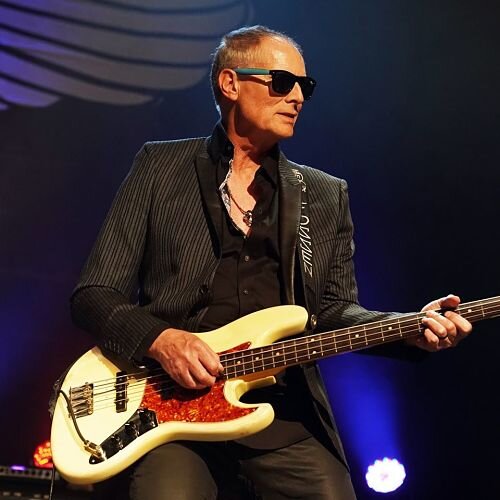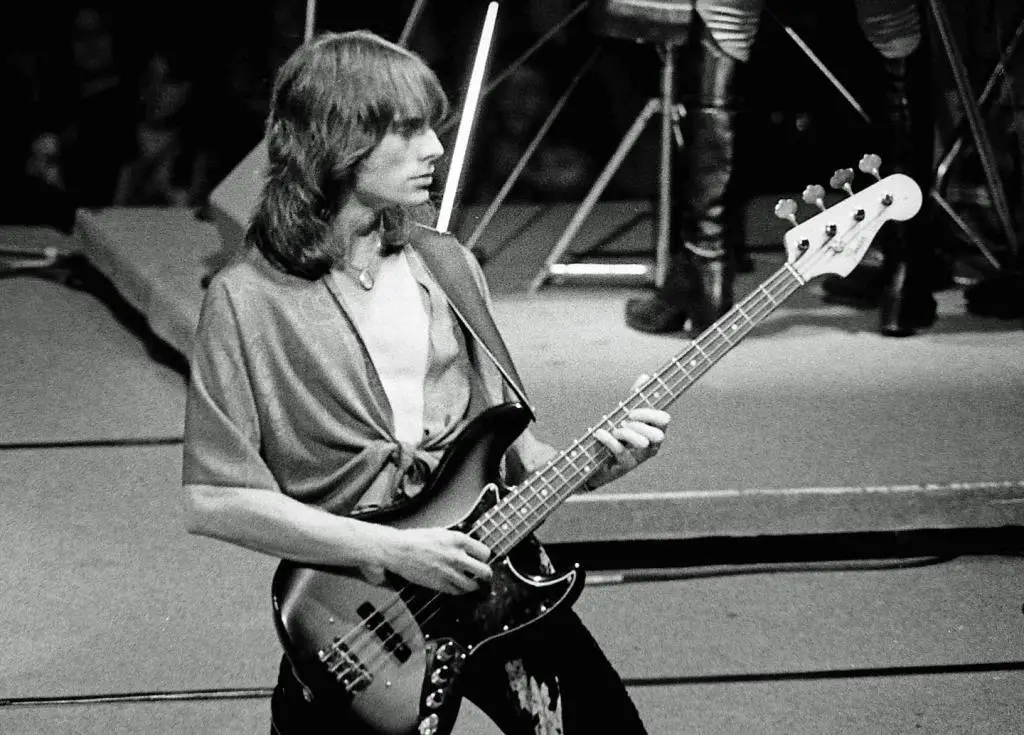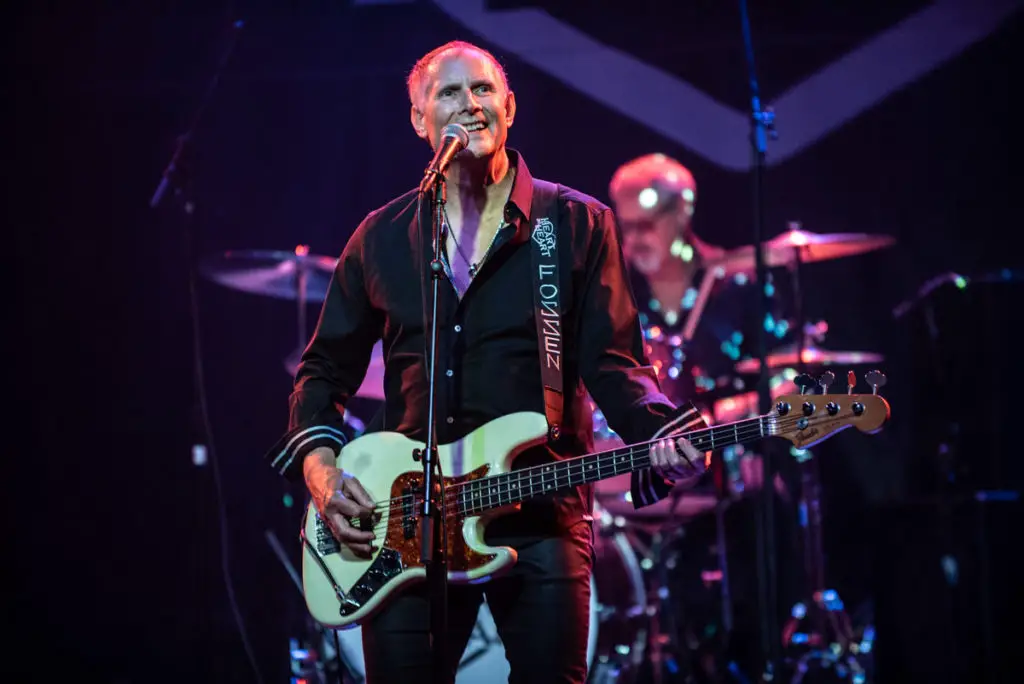All images courtesy of John Lappen PR

Recently, I sat down with veteran bassist and Rock & Roll Hall of Fame inductee Steve Fossen to discuss, among other things, what he’s been up to during the lockdown, his time in Heart, his passions outside of music, and what he’s looking forward to the most once COVID-19 breaks.
If you would like to learn more about Steve or his current band Heart By Heart, head over to the band’s website and dig in. Once you’ve done that, check out this interview with Steve Fossen. Cheers.
Andrew:
Steve, I appreciate you taking the time today. How have you been holding up over the last year or so? What have you been up to?
Steve:
Heart By Heart’s last show was on March 7, 2020, in Yakima, WA. The pandemic was fast becoming a major concern. The first cases in America were less than 3 miles away from where I live near Seattle. Somar and I had our annual Disneyland trip already booked, and we spent 4 days at the crowded park in February where no one was wearing masks and no social distancing. Airport and plane travel with no precautions whatsoever. Back in Seattle, we took our niece to a crowded theatrical production of Frozen. Needless to say, we were lucky to start the shutdown healthy and happy. We treated the shutdown as a chance to catch up on projects and pay attention to our bodies and health. We cooked at home and had regular walks and hikes. Instead of gaining the “COVID 15,” we actually lost weight.
We started off 2020 with a fantastic run of shows in Washington state and fly-away shows in Wisconsin (20º below) and Florida (80º beautiful and historic). The rest of our year was pretty full of local shows and many more fly-away dates. Of course, all the dates were either canceled or postponed.
Andrew:
Before we dive into your professional career, let’s go back a bit. What first got you hooked on music?
Steve:
I was born in 1949, and my family always had the popular music of the day playing on the radio. My sister and I were allowed to choose and play records, and we loved the music our parents had on hand. At school, I loved singing all the songs of the seasons with my classmates, especially the Christmas song. My parent’s good friends had an organ that my parents would sit me at to keep me out of their hair while they visited. I could and would figure out the melodies of the songs I loved. My mom enrolled me in Hawaiian guitar lessons. In elementary school, I was encouraged to play trumpet, where I played in the school band and played the National Anthem for school assemblies.
I absolutely loved the popular music of the 50s. It was so diverse where you could hear the harmonies of the McGuire sisters, the Everly Brothers, the excitement of Elvis, the Doo-Wop, Roy Orbison, Ray Charles, The Chiffons, Dale & Grace, Santos & Johnny, The Shirelles, The Tokens, I can’t name everyone. Summer vacation was spent visiting my grandparents in a small town in Idaho, where I was exposed to country music playing on the jukebox. Hank Williams was popular, and he had a great band. I was then and continue to be inspired by those amazing artists and recordings that sound as good today.
Andrew:
Where did the bass come into play for you? More specifically, where did the guitar and bass come into the picture?
Steve:
My dad’s brother was a guitar player, and my father was a merchant Marine who, after the war, sailed back and forth from Japan. On one of his voyages, he purchased an acoustic guitar for his brother, and it was at our house for a few years before his brother could pick it up. It was the most fascinating and magical thing to me. I was young, and I would open the case and just stare at it. The look. the smell, the rich sound.
My father also brought home transistor radios from Japan, and I would listen to music while I went to sleep. I taped a small radio to the handlebars of my bike. One day riding to my friend’s house, “From Me To You” by a brand new group from England came on. I was so excited and distracted by this wonderful sound I lost track and almost went into the ditch. For the next few years, I was caught up in the so-called British invasion, and I came to the conclusion I wanted to play music in a Pop group. Since The Beatles were my favorite group and Paul McCartney played the bass, that’s what I wanted to play. My dad hearing me constantly listening and talking about the bass took me to the music store, and we rented an electric bass and amplifier. No one could pry it out of my hands, and every second of my spare time was playing and learning all I could about this wonderful instrument. I love everything about the bass, the look, the sound, the powerful amplifiers one must play through to make it sound right.

Andrew:
You had a long career with many credits, but let’s talk about recent events first. Tell us about Heart by Heart. Take me through the formation.
Steve:
Somar and I met when Mike, Rog, and I, after many years of not playing any Heart music, needed a singer so we could play a couple of Heart songs for a party in February of 2008. I admired her singing and personality, and over the course of the spring, summer and fall became good friends; by the winter, we took it to the next level and fell in love. For fun, we would play songs we liked as a vocal bass duo. People heard of this, and we would play casually for family get-togethers, dinner parties, etc. Then we got offers to play at Bistros, Jam Nights, and clubs where we made special appearances. We played a wedding and a funeral too.
We needed a name; Somar came up with “Heart By Heart,” which explained our situation together perfectly. A promoter in Anchorage, Alaska, heard about us and asked us to open up a show for Dwight Yoakam. We thought a duo was too light to open a show like this, so we asked Mike Derosier to play drums and our friend and Jimi Hendrix artist Randy Hansen to play guitar. We put together a set, and 1 week before we were to leave for Anchorage, Dwight decided not to go to Alaska. We were disappointed, but we had fun playing together, and in October of 2011, our good friends asked us to do a benefit for the Susan G. Komen Foundation. We played and raised a good amount of money, and people who saw us mentioned us to the local booking Agent who started booking us around Washington, where we opened up for Joan Jett on the 4th of July.
After Mike and I were inducted into the Rock & Roll Hall of Fame in April of 2013, we met and asked Lizzy Daymont to sing and play guitar and Bob Rivers famous radio personality, to play keyboards with us. We created a website, and an agent from Baltimore contacted us and booked us on the East Coast. We started getting regular bookings all over America, and we are looking forward to resuming live shows this year. Musicians come and go, and the current lineup of Heart By Heart is Somar Macek, lead vocals, Lizzy Daymont, guitars, keyboards, and harmony vocals, Michael Derosier, drums, Chad Quist, guitars and vocals, and Steve Fossen, bass and vocals.
Andrew:
I wanted to touch on where you first came into the spotlight, which was with the legendary Rock band Heart. How did you get the gig?
Steve:
I, along with my schoolmate Roger Fisher started the group that would become Heart in October of 1967. We were called The Army for the first year; then, we changed the name to Whiteheart in 1968, and in October of 1969, we became Heart. We were a popular band during these years, and members came and went. In the summer of 1971, we put an ad in the local newspaper for a singer, drummer, and guitar player. Ann Wilson answered the ad, and she passed the audition. We found Ann to be as driven and ambitious as we were. We emigrated to Canada in 1972, where Ann, Roger, and I formed the core of the band that would in 1975 record Heart’s debut LP Dreamboat Annie. Howard Leese and Mike Flicker grew up together in Los Angeles and emigrated to Canada around the same time we did. Howard did so much of the guitar and keyboard parts that it seemed logical to have him join us for the tours. We heard of this great drummer, Michael Derosier, from Seattle, and we asked him to not only join Heart but to play on the last 2 songs to complete Dreamboat Annie.
Andrew:
You were a part of so many classic albums and songs with Heart. You were the group’s bassist through what I would call their “classic” period. What do you recall about the recording of records such as Dreamboat Annie, Magazine, and Little Queen?
Steve:
Dreamboat Annie came about when Mike Flicker and Mushroom Records discovered us playing venues and clubs in and around Vancouver, BC. We were popular and constantly played in British Columbia and Alberta. We were experienced in playing live but relative rookies in the studio. Mike Flicker had a vision for us, and we wrote songs, sang, and played according to his lead. “Magic Man” was the first song I played on for the LP, and to this day, it is one of the highest-tested radio songs in history. We recorded in the summer of 1975, and the weather was beautiful. I used my trusty 1959 Fender Precision bass for most of the cuts. Dreamboat Annie was recorded at Can-Base Studios with a Universal Audio vacuum tube mixing console onto an Ampex MM1000 16-track tape recorder. The mix down to 2-track was done 30 seconds at a time and spliced to the master. The whole band was squeezed in around the mixing console, each individual responsible for a volume or EQ tweek.
The 16-track 2” tape was lost, and all master 2-tracks were worn out in the USA and Europe. Mike Flicker found a suitable 2-track master in Australia, which was used to create digital CDs.
The studio tracks for Magazine were recorded at Can-Base Studios during our breaks while touring America and promoting Dreamboat Annie in the summer of 1976. We weren’t rookies anymore, and we were confident because Dreamboat Annie was selling so well, and we were opening up for the premier popular bands of the era and playing for huge crowds. Unfortunately, before Magazine was finished, we had a business problem with Mushroom Records, and we left the company and signed with Portrait Records, a division of Columbia Records.
Our first record for Portrait Records was Little Queen, and it technically became our second LP to be released to the public. Magazine was held up in the legal system. Shortly after Christmas 1976, all the members of Heart and Mike Flicker moved to the Seattle area. We set up shop at Kaye-Smith studios and wrote, rehearsed, and recorded Little Queen. Confidence was running high, and we were given much more leeway in the decision-making in the studio after Little Queen Heart became a headlining act touring the USA.

Andrew:
I believe the last album you lent your talents to with Heart was Private Audition. What led to your departure from the group thereafter?
Steve:
After we recorded Dog & Butterfly, Roger & Nancy, Mike Fishers and Ann’s relationships fell apart, and the rest of us voted to remove the Fishers from the band. Heart then recorded Bebe Le Strange and the Greatest Hits Live LPs. After Private Audition, Derosier and Fossen were voted out of the band.
Andrew:
Looking back, what are your thoughts on your time with Heart? Have any favorite moments? Will we ever see you take the stage with Heart again?
Steve:
Heart was the culmination of my young man’s dreams and aspirations. I started playing bass professionally in 1965 and recorded Dreamboat Annie in 1975, toured Canada, the USA, and free Europe in 1976. More tours and several double-platinum LPs in the subsequent years. The songs I played on are listened to, bought, downloaded, and streamed all over the planet every day. At any given second during the day somewhere, our music is being appreciated. My personal favorite moment is playing our show at the Cotton Bowl Dallas- Texas Jam on July 1, 1978. Playing “Crazy On You” and being inducted into the Rock & Roll Hall of Fame on April 18, 2013, Nokia Theater, Los Angeles, CA.
I would love, and a great many fans would love to hear and see the original 6 members of Heart perform and tour again. I personally would love to do a tour of thanks to the fans who have supported us all these years.
Andrew:
How would you say you’ve progressed as a musician as you’ve gone on? What’s the biggest difference between the Steve Fossen of the 70s and 80s and the Steve Fossen of 2021?
Steve:
Steve Fossen today is not all that different from the Steve Fossen of the 70s and 80s. My goals when recording and performing live are similar. I “Do my best to do my best.”
I get to play the songs we made famous in my current group Heart By Heart. We play the Heart catalog with as much precision and accuracy as possible.
Over the years, I have acquainted myself with diverse elements of music from all over the world. I have quite a collection of movie soundtracks. Learning and analyzing these works is a challenge and a joy. However, I am still able to enjoy music without an analytical ear sometimes! [Laughs].

Andrew:
Are you into vinyl? Cassettes? CDs? Or are you all digital now? What are a few of your favorite albums, and why?
Steve:
I still have a turntable and my original collection of vinyl. Cassettes were an awesome convenient portable way to enjoy and analyze music; I own many. I have quite a few CDs; however, not a fan of remastering and remixing. The digital realm is where I am now. I am, like most folks nowadays, living in a song-based reality where my whims can take me to any musical pleasure at any moment. I much prefer the original recordings from the era they were popular.
The Soundtrack from Amadeus is still a favorite. Mozart, is impeccable.
Days of Future Past, Moody Blues one of the first LPs I bought.
The Nutcracker ballet, Tchaikovsky, Mozart was his favorite composer.
Andrew:
What other passions do you have? How do those passions inform your music, if at all?
Steve:
I developed a passion for wilderness and mountain activities. Hiking, peak bagging, camping (not car camping), any weather, every time of year. (no chair lifts ever, earn your turn) snowshoeing, cross country skiing, and exploring. Not just for the beauty, although beautiful, a magical something the mountains and elevation share with the aware. The skills needed, courage, effort, and concentration to travel safely are mind-clearing. Being lost, stalked by a mountain lion, coming face to face with a 300 lb mountain goat, a black bear sow with her cub, rockfall, snow avalanches, repelling on a frayed rope, all must be studied and carefully understood like playing the bass.
Andrew:
Last one. We seem to be nearing a light at the end of the tunnel in terms of COVID-19 restrictions. That said, what’s next on your docket?
Steve:
For Heart By Heart, most of the band is fully vaccinated. Our potential audience is in theory getting vaccinated. Wearing face covers and social distancing are part of our industry (and our civilization) getting back on track.
Many shows have been postponed till 2022, but there are some scheduled for this summer. It may be too early to guarantee they will be played but so far it’s looking good. Plane travel and a car traveling with the unvaccinated may not be feasible. However, we will encourage all to help us get back to playing and traveling.
As a couple, Somar and I will continue striving for a healthy prosperous life together, enjoying good food, healthy activities, and nourishing relationships with family and friends.
As a couple, Somar and I will continue striving for a healthy prosperous life together, enjoying good food, healthy activities, and nourishing relationships with family and friends.
On a personal level, I will continue my quest to “Do my best to do my best”!

Interested in learning more about Steve Fossen? Check out the link below:
Dig this interview? Check out the full archives of Vinyl Writer Interviews, by Andrew Daly, here: www.vinylwritermusic.com/interview





Leave a Reply